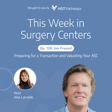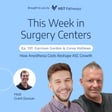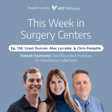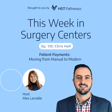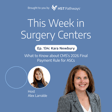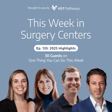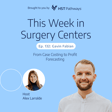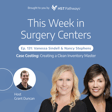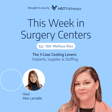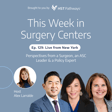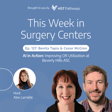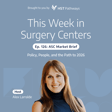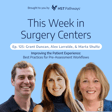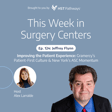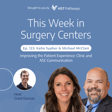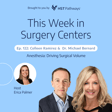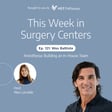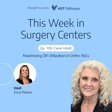Introduction to Podcast on Surgery Centers
00:00:01
Speaker
Welcome to This Week in Surgery Centers. If you're in the ASC industry, then you're in the right place. Every week, we'll start the episode off by sharing an interesting conversation we had with our featured guests, and then we'll close the episode by recapping the latest news impacting surgery centers. We're excited to share with you what we have, so let's get started and see what the industry's been up to.
00:00:27
Speaker
Hi, everyone. Here's what you can expect on today's episode.
Challenges in Predicting Case Profitability
00:00:32
Speaker
Surgery centers often struggle to predict if a case will be profitable before taking it on, especially with complex and high-acuity cases. Gavin Fabian is the Chief Innovation Officer at HSC Pathways, and alongside his team, he decided to tackle this problem head-on and build first-of-its-kind software that would arm ASCs with the data they need
00:00:53
Speaker
to avoid unprofitable cases and take on cases with financial confidence. In this episode, you'll learn about the development of HSC Profit Forecast, its many use cases and what your peers are saying thus far.
00:01:07
Speaker
In our news recap, we'll cover a little bit of the CMS 2024 proposed payment rule, Northwestern medicine to AI success, an Ohio physician who lost her license and of course, and the new segment with a positive story about a woman's dedication to receiving her nursing license, even with 35 years of setbacks. Hope everyone enjoys the episode and here's what's going on this week in surgery centers.
Role of Chief Innovation Officer in Industry Solutions
00:01:40
Speaker
Gavin, welcome to the show. Thanks Nick. Gavin, can you tell us a little bit about your role here at HST? Sure. I'm the chief innovation officer at HST and I effectively build startups that leverage all the strengths that HST has as a company.
00:01:58
Speaker
So I think you've got one of the most interesting roles, probably an ASC technology, right? Which is you get to find problems within the industry underserved by technology and decide what projects you want to take on. Tell me a little bit about the latest problem that you've been researching and how it came across your radar screen.
00:02:18
Speaker
Yeah. So part of my job is just to keep a pulse on the bigger unmet needs that surgery centers face today. And one of those that I've been hearing consistently over the last couple of years is the challenge in understanding if a case you're going to take on will be profitable or not before you do the case.
00:02:38
Speaker
Especially as surgery centers take on more complex cases, higher acuity cases, more implants. There's a lot of complexity in trying to figure out what you're going to get paid for that case, as well as what the costs are going to be. And at HST, we have a lot of the data that if analyzed effectively can give you the answers to those things. So we thought that would be a really, really interesting problem to solve and that we were capable of based on the data we have.
00:03:06
Speaker
Got it. So focusing in on this problem or challenge around case profitability. And I got to imagine a bunch of different problems or ideas come across your desk. How did this idea of case profitability, this challenge, how did you first get connected with
Expansion of Profitability Solutions Beyond Implants
00:03:24
Speaker
this? How did you first find out about it? Yeah. So the way we started out on this project was we wanted to help centers
00:03:34
Speaker
better understand the costs of their implants in advance of a case. And as we started diving into this with facilities, basically the solution was a view of our financial profile of a case with implants.
00:03:49
Speaker
And what we heard back from our customers was, this is awesome. I need to see this for every case. And so it became less of an implant-focused solution. I mean, it still is very useful for implant cases, but it became really a way to look at your entire schedule and be able to see profitability for upcoming cases.
00:04:11
Speaker
Yeah, super interesting. So started a little narrower and then you've kind of broadened it from there. I found that's how many startups and innovation focused projects begin and end is where you learn so much along the way by diving in and spending time with your customer. And a lot of the value creation has
00:04:32
Speaker
being nimble and willing to take a turn and let your customer guide you to where the value is. And this was another case of that where what we ended up with is different than what we planned on starting with same theme, but I think a lot more valuable to our end users. Yeah. And that's super interesting. And I'm curious about this kind of startup approach you take in general, right? So, you know, there's this idea that you guys were talking to customers about, about implant profitability.
00:05:00
Speaker
in case profitability. And so you had a problem or an idea. What do you then go do to validate that, you know, with others in the market or how do you kind of stress tests that this is a problem that resonates with folks?
Data and Customer Interaction in Industry Problem-solving
00:05:12
Speaker
Yeah. I think you have to take a research and data driven approach combined with get your hands dirty and actually see it yourself and get in there with the centers. Cause there's just things that you don't see by just looking at market data. Like if you were to try to.
00:05:29
Speaker
look at market data on percentage of cases that come at a loss. Like you really won't find a lot there, but when you go into centers and you start asking those questions, you can get a pretty good feel. And you can also see how they're actually solving the problem today. Like what are the tools they have and maybe the tools they have, you can't do any better. And you don't know that until you really get in there. So we spend a lot of time with centers and then we look for data to provide a macro view of what we're seeing as well.
00:05:57
Speaker
Got it. That makes sense.
Efficiency and Profitability in Surgery Centers
00:05:59
Speaker
And so for this particular challenge around case profitability during your discussions with customers, what are the implications of this? What are the implications of not knowing case profitability or getting it wrong or being surprised? Yeah. Well, if you're, for example, um, Facebook, it's probably important to you that you know how long
00:06:22
Speaker
users are spending on different parts of your website, right? Because the parts where they're spending more time, those are where you're going to want to sell more ads or you're going to want to optimize those parts of the page more across most businesses. There's really critical data that you need to optimize your business. And if you're running a surgery center, the goal is providing great outcomes at a great price. That surgery center efficiency is such a strategic advantage, but if you're going into cases and
00:06:52
Speaker
You don't really know if the case is profitable or not. Forget how profitable or how unprofitable. It's a bit of a problem when you're trying to optimize your business model and do cases with greater confidence. So give that visibility so that you're not flying blind, what you're working with before you go into the case.
00:07:11
Speaker
Yeah, it makes sense that a big component of overall ASC profitability or center-level profitability is the case profitability, the case mix and the profitability around those mix. Got it.
Complex Payer Contracts and Case Mix Challenges
00:07:25
Speaker
In your initial conversations with customers, are there certain types of cases that present more of a challenge than others? Yeah, I think that the centers that
00:07:36
Speaker
Our most challenged in this area are centers that have large variety or diversity of case mix. If you're a facility doing a relatively small number of ophthalmology cases, you can know what you're getting. But most centers that have three or more ORs or even smaller multi-specialty centers, it is a real challenge. Payer contracts are.
00:07:56
Speaker
exceptionally complex, I cease to be amazed by what I find when working with customers as far as like how cases are paid, how implants are paid, are their caps, are the minimum. So I think those are the centers that are most challenged in this area. Yep. Yep. That makes sense. And if ASCs could snap their fingers and solve this problem and have accurate visibility, real-time visibility into case profitability across all their cases,
00:08:26
Speaker
What could they do with this information? What would they change, if anything, in terms of the way that they go about providing care? Yeah. What we found is that when centers do recognize that a case is going to be unprofitable or close to unprofitable, that there are things that you can do to keep that case, but make it not a negative case for the center.
00:08:49
Speaker
For example, you can reach out to your implant vendor and work on getting a better price for a product or kind of a one-time exception. You can work with a physician to find ways where you can be more cost efficient with that case and still take it. And the earlier you find out about that case, the more flexibility you have to find a solution that makes that case viable, that makes it workable. The challenge that centers have is
00:09:16
Speaker
First, many centers don't have a process for evaluating the profitability of a case in advance. And the ones that do have a process, it's very, very time consuming. It involves pulling multiple sources of data into really complicated Excel models that one person at the center knows how to look at. And by the time they actually run it through that model, usually you're like two days before the case.
00:09:41
Speaker
Now, how much flexibility do you have to have a thoughtful conversation with your doctor in 48 hour notice or your implant rep, or maybe you need to push the case back, but you can't give a patient two days notice. So I think the impact is that you can take the cases that are most problematic for your center financially and resolve them, figure out a way to make them profitable or just be more efficient on the case, but you have more notice.
00:10:10
Speaker
Yeah. So it sounds like it's not as simple and straightforward as, Hey, should we take on this case or not? It sounds like some of the nuance ready. The opportunity here is okay for cases that tend to be more unprofitable. It's getting visibility into those with enough time to take action on that. Right.
00:10:30
Speaker
A hundred percent. And a lot of times the staff at the center, and again, I'm speaking from just my experience building this and working with say like, you know, 30, 40 centers that we're talking to on a regular basis, is the staff prefer not to move the case. A lot of times they're nurses first and they deeply care about patient care. And so they want to find a solution to make it work. And they take pride in their center's ability to make
00:10:57
Speaker
tough cases work because they're so efficient. But oftentimes you need the physician and the rep involved in being a partner and solving these cases. And when they have the data, like when you can show a physician what you're looking at and it's not very disputable, that physician becomes a partner much easier than if you don't have the data. And the conversation is less intimidating for the staff member because they're just saying, hey, this is what I'm looking at. Am I looking at it the wrong way? And usually it facilitates a conversation that makes things better.
Automated Profitability Forecast Tool
00:11:27
Speaker
Yeah helps with that buying process i'm sure you've been researching this problem and i understand that you're actually launching a product coming up that help centers address this you tell us a little bit about the product you're watching.
00:11:40
Speaker
Yeah, I think I was alluding to it a little bit earlier, but basically we've built a tool that kind of takes advantage of all the data that we have from the other HSD products. And in a completely automated way, when you open up the product, you see a auto-generated profitability forecast for all your upcoming cases.
00:12:05
Speaker
And when you open up the case, you can see the breakdown of revenue based on your pair of contracts, but also based on historically what you're getting paid for those type of cases. And then you can look at your costs broken down by staff, supplies, implants, overhead, etc. And there's a bunch of workflows in there where
00:12:27
Speaker
You can have cases flagged if they meet certain criteria that need extra review. I think in short, what the product does is it finds the problem cases for you so that you have the time to go solve them or fix them. I think what we've seen is centers spend so much time just trying to find those cases. They're left with very little time to do the high value work of resolving the problem.
00:12:51
Speaker
Right. Right. So it sounds like your product pulls in a profitability snapshot and I assume you've got the revenue information in there on a particular case. You've got cost information in there. How do you pull in the revenue side of the equation?
00:13:06
Speaker
Yeah, so HST has so much data that it can pull from based on the products a customer has. So we look at it as kind of levels of data enrichment based on the amount of HST products you're using. But in the most basic sense for our centers that are HST practice management, we get the revenue estimate by looking at pair contracts. And we do the look back on every time you've scheduled a certain procedure with a certain pair,
00:13:35
Speaker
What did your contract say you were supposed to get paid? And not only that, what did you actually get paid? And then we show both of those numbers. And sometimes it's pretty interesting that if you are supposed to get paid through your contract $6,000, but you're actually getting paid $3,000 that has in some cases been a cue to dig in and figure out what's going on there. Yeah. Okay.
00:13:58
Speaker
And so that's the revenue side. So it sounds like a mix of the contract information and what's actually happened, the historical receivables. What about the cost side? How do you get case specific cost information?
00:14:12
Speaker
Yeah. So the cost side is something that is probably the source of most conversation during the implementation process because every center is a little bit different. And we found that centers range from not having good cost data that's useful and having very good cost data across those buckets that I mentioned, staff.
00:14:33
Speaker
rather than taking an approach where we say, hey, you have to use our products in a way that produces useful cost data for profit forecast, our product. Well, what we do is we kind of meet the center where they're at. So maybe they just don't document certain costs on purpose because they believe that it's making them more efficient. Then usually those centers will know because they've done a look back on their costs that, hey, our ortho cases in general are,
00:14:59
Speaker
$18 per OR minute and staff costs. And so we can use a rules-based approach where the cost data isn't useful and where the cost data is useful in practice management, we point to that data. So either way it's automated. It's just, are we using your own historical data or are we generating some rules that then drive the costs? Got it. So I was like, there's a couple of different ways to get at it. Yeah, exactly.
00:15:24
Speaker
Okay, so I think I've got my head around how this is working in terms of estimating case profitability. What feedback have you gotten with customers that you've talked to or customers that are using the product already? Yeah, a lot of feedback. So I think that the initial reaction when customers see this is almost as, wow, we don't do this. So we don't do this to this level of detail, because just doing this analysis on one case can take a half hour to an hour.
00:15:52
Speaker
And now this is automatically produced for the next 250 cases that are under schedule. So the time savings or the ability to just do this analysis that wasn't possible before is really helping centers find problems and go and fix those. The other is many times the centers that do some analysis on this are doing it through one or two highly tenured
00:16:19
Speaker
employees at the center that know their contracts, that know the vendors, like they have really intimate knowledge, but that knowledge isn't scalable to the rest of the team. And so centers have said, Hey, we set this up with our most tenured staff member that knows all this information, but now those rules are in there. They can educate and scale it across the rest of the center. So it's given a little breathing room to those key staff members that are the only people that know this stuff.
00:16:45
Speaker
Yeah. And there's probably some bottlenecks in the process. I'm sure if only one or two folks can operate that. Right. Yeah. Okay. Fantastic. For folks that are interested in discussing this topic further, case profitability or the profit forecast product that you're launching, what's the best way for them to get more information or get in touch? I think the most straightforward way is just go to hstpathways.com, book a demo, and then we can dive into really
00:17:12
Speaker
all the details from showing the product, having a conversation just about what we've learned in the process. We want to be a partner and help wherever we can in this area. All right, Gavin, final question for you here. We do this with all of our guests every week. What's one thing that our listeners could do this week to improve their surgery centers?
00:17:30
Speaker
So I think in the centers that we've spent time with that are the most efficient, most effective, tend to have employees that have been there a long time. A lot of these centers have a director of nursing or a head of their OR scheduler that they just have so much knowledge that they've developed about the center and they take a lot of pride in the facility. So really anything that
00:17:55
Speaker
you can do to engage employees, show appreciation, uplevel their skills, but just keeping the team in place seems to drive a lot of positive effects for the centers that we work with. Love it. It's all about the team. Gavin, thanks so much for joining us today. Really appreciate the conversation. Cool. Thanks, Nick.
00:18:17
Speaker
As always, it has been a busy week in healthcare, so let's jump right in.
CMS Proposed Payment Rule 2024 Impact
00:18:22
Speaker
As you likely have heard, CMS released its 2024 proposed payment rule.
00:18:28
Speaker
As the rule in and of itself is 963 pages, our clinical experts are currently sifting through everything that is in the document, and we are planning a bit of a deeper dive into the good and the bad of what has been included for next week's episode. But for now, the biggest update on everyone's mind is the average rate update. So if the proposed rule were to be finalized as drafted, ASCs would see on average overall
00:18:57
Speaker
covered procedures, an effective update of 2.8%. This number is a combination of a 3% inflation based on the hospital market and a productivity reduction mandated by the Affordable Care Act of 0.2% points.
00:19:14
Speaker
It is important to note though that updates might vary significantly by code and specialty. So you will want to look closer at the document to see how you might be impacted. And CMS will be accepting comments on the proposed rule through September 11th. And obviously the more ASC voices that can be included, the better. So I strongly suggest you take a few minutes to share with CMS what you think about what they have put forward.
00:19:39
Speaker
And of course, we're doing the same on our end, but keep a close eye on what ASCA has to say. They have already done a great job summarizing a few things and put some thoughts together already on the feedback they will be providing.
AI in Polyp Detection at Northwestern Medicine
00:19:55
Speaker
And in this week's AI news, Northwestern medicine gastroenterologists achieved a 13% increase in the detection and removal of colorectal polyps with the assistance of artificial intelligence during the colonoscopy. So the research used the FDA approved Medtronic GI Genius computer aided detection system, which resulted in higher removal rates compared to procedures without AI.
00:20:24
Speaker
And for context, each 1% increase in detection rates is associated with a 3% decrease in the risk of colon cancer within five years. So the use of AI in colonoscopies could potentially reduce future colon cancer diagnoses by up to 39%.
00:20:44
Speaker
And based on the positive results from the research, Northwestern Medicine has invested in GI Genius Devices, as you can imagine, intending to equip every endoscopy suite in its nine acute care hospitals and four outpatient locations in the Chicago suburbs. This shows the first of many commitments we'll see to using and developing AI technology to enhance patient care in the healthcare system. And of course, what we always like to share
00:21:13
Speaker
is that this technology is being used alongside doctors. So it's never intended to be used alone, but it is intended to be used in tandem to enhance and improve what the human eye can do. I was recently on Doc Buddy's podcast to talk about all things AI and healthcare. So I know we're always sharing AI news, but if you're interested in learning more about use cases and pros and cons, I highly suggest checking out Doc Buddy's episode.
Dr. Roxy's License Revocation and Social Media Risks
00:21:45
Speaker
All right, story three, an Ohio plastic surgeon who gained popularity on TikTok for live streaming operations has lost her medical license. Dr. Catherine Roxanne Graar, I'm probably saying that wrong. Her last name is G-R-A-W-E, also known on social media as Dr. Roxy, will no longer be able to practice medicine in the state of Ohio.
00:22:17
Speaker
Three patients reported having complications following procedures with Dr. Oxy and complications that would not normally arise during the procedures she was performing. Now, that's a key part of this. These three patients were forced to seek medical attention after their surgeries according to medical board records with some reporting skin tears, infections, and other serious complications.
00:22:37
Speaker
and must pay a $4,500 fine.
00:22:44
Speaker
An attorney representing the state's case against Dr. Roxy shared, this case isn't about some antiquated view of social media. These patients trusted Dr. Roxy because of what they saw on social. She made major surgeries with potentially life altering complications seem like one big party.
00:23:05
Speaker
According to USA Today, the secretary of the medical board warned Dr. Oxley at least twice in the last four years before her license was suspended. So this did not come out of nowhere for her. And in September of 2021, she was urged by the board to take remedial education courses on plastic surgery complications, but allegedly continue to film and live broadcast the procedures. You can also see in her live streams that she's
00:23:33
Speaker
actively reading comments while actively operating, which obviously is incredibly dangerous. And I think
00:23:41
Speaker
For me, what is so frustrating about this case is, of course, patients were put in harm's way for absolutely no good reason. That's first and foremost. But then second, social media can be a wonderful way to share educational and informative healthcare-related content with your communities, and it can absolutely be done in a way that causes zero harm to patients. In stories and scenarios like this,
00:24:07
Speaker
It's just kind of a classic case of how one bad apple can spoil the bunch. And the way the media is writing these headlines, obviously it makes it look like TikTok is the problem when it's not. It's the irresponsible use of TikTok and other platforms that is the problem. So I wish these three patients well, and I hope they can fully recover from this experience. And if you are interested in learning more,
00:24:32
Speaker
about this case specifically and the positives that can come with having a social media presence. Dr. Grunch will be joining us next week's episode to share the success that she's experienced firsthand on TikTok and other platforms.
Rhonda Trotter's Journey to Nursing
00:24:50
Speaker
And to end our new segment on a positive note, after 35 years, Rhonda Trotter fulfilled her lifelong dream of becoming a nurse. After high school, Rhonda's mother told her there were too many nurses, so she took a job at the postal service.
00:25:07
Speaker
She decided to eventually go to nursing school, but then while she was there, both of her parents fell ill, so she had to leave school to care for them. She got back to nursing school in January 2019, and she now works alongside some of the doctors who actually helped care for her parents. So congrats, Rhonda, on being recognized as Nurse of the Week for your resilience and determination in becoming a nurse.
00:25:33
Speaker
And that news story officially wraps up this week's podcast. Thank you as always for spending a few minutes of your week with us. Make sure to subscribe or leave a review on whichever platform you're listening from. I hope you have a great day and we will see you again next week.

